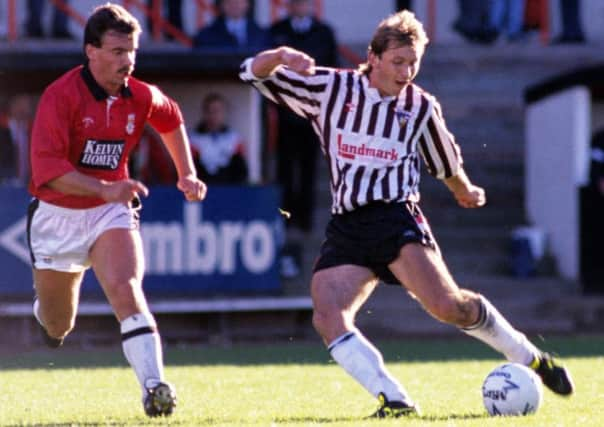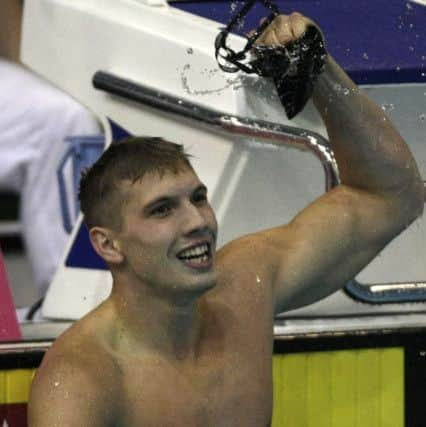Made in Fife: the Olympian swimming for Hungary


Liverpool supporters might have had their interest piqued too, since Istvan Kozma found a perhaps different form of renown there compared to East End Park. The fact the swimmer being referred to was Hungarian only heightened the intrigue: “Hmm, I wonder?”
Some basic research would have satisfied their curiosity. Yes, Dominik Kozma is indeed the son of Istvan, so fondly recalled by fans of Dunfermline from the late 1980s and early 1990s.
Advertisement
Hide AdAdvertisement
Hide AdIn fact, the Olympian’s association with the Fife town is just as indelible. Although now representing Hungary, Dominik was born in Dunfermline. He carries the town with him wherever he goes, including Brazil.


Like the colours of the stripes his father once wore with such distinction for the Pars, it’s there in black and white on the official Olympics website: born April 10 1991, Dunfermline.
It seemed a reasonable excuse to put a call in to Istvan, the artful midfielder who now isn’t even the most famous Kozma in his own household; Dominik is competing in his third Olympics. Aged 25, he isn’t necessarily content with that either and is eyeing a fourth appearance in Tokyo in 2020. Britain’s loss is very much Hungary’s gain.
“So Istvan, what’s the deal here? Dominik’s a Scot. Why is he not swimming for team GB?”
His father actually managed to represent both Hungary and Scotland in a sense; Istvan was selected by Jim McLean to play in a Scottish League XI that took on a Scotland select to mark the league’s centenary in 1990.


“He is Scottish and Hungarian!” explains Kozma. “But he needed to choose. So he chose Hungary. That is why.”
In order to answer such questions, Kozma is taking a break from coaching duties at the Budapest football school where he is a director. Friday is switchover day. There’s a new intake of pupils due, but he promises he will have a few minutes to chat. In the end, he blesses you with over three quarters of an hour of his time. In fact, he seems reluctant to stop.
“You know, at that time, because of the football and because of my life outside football, I was very, very happy,” he says when reflecting on his time in Fife.
Advertisement
Hide AdAdvertisement
Hide AdNot only was one of his sons born in Dunfermline (he has another son, Istvan junior, who is 14). But the Fife town was where he heard he had become a father for the first time. His daughter Eveline arrived just after he signed for Dunfermline, 27 years ago next month.
As for Dominik, he has clearly inherited his father’s sporting genes. Why is he not a footballer? “A lot of journalists ask him that,” says Kozma. “When he was four years old we put him into kindergarten and he started to swim. We put him to a special school where he could swim. We were thinking it didn’t matter what he did later on. Even if he wanted to be a footballer, swimming is good. It is good for everything because it keeps you so fit.
“Afterwards, he could swim very well. Every year he is getting better. And he liked it. When he was six or seven, I took him to a football academy. He was very good, with a fantastic left foot. But when it came to choosing if he was a swimmer or a footballer, by that time he had been swimming longer.”
He has spent part of nearly every day for the last 21 years in the water. He holds the current record in 100metre freestyle in Hungary. Before a shoulder injury hampered him last year, he swam the fourth fastest time in the world for 200m freestyle. That injury, together with a niggling strain picked up while competing last week, is one reason why he was unable to produce his best form in Rio. He failed to reach the final in both individual events.
Kozma has not been able to watch for himself any of his son’s three Olympic appearances. He was involved in the same football school four years ago when Dominik was in London. In 2008, when Dominik was in Beijing for his debut appearance as a 17 year-old, his father was coaching at Vasas SC and the Hungarian league season was already in full flow.
“It is very unlucky,” he says. “But he is a big boy now, in every way – I am 1.82m tall, he is 1.96m. Maybe that’s why he is a swimmer. He has a possibility I hope to go to a fourth Olympics. He will be 29. Hopefully then he can do better.”
There was no question Kozma showed what he could do at Dunfermline, where he made 103 appearances in just over two years and a-half-years. Scottish football was rocked by the capture of this continental star. After all, Dunfermline wasn’t the natural destination for a player from Bordeaux, who’d recently finished runners-up in Ligue 1. They also didn’t tend to pay £540,000 for players very often either. Indeed, Kozma remains Dunfermline’s record transfer to this day.
“Jim Leishman (the Dunfermline manager) and Blair Morgan (Dunfermline director), they came to Bordeaux to talk to me,” he recalls. “They told me Dunfermline had just been promoted to the Premier Division and they wanted to stay there. I thought why not? I liked this idea.” Kozma bought into the move, choosing to live in Dunfermline rather than Edinburgh, hence his son’s birthplace.
Advertisement
Hide AdAdvertisement
Hide AdHis enthusiasm for life in Scotland translates down the phone line from Hungary to Scotland decades later. Illustrating just now content he was, Kozma explains how difficult he found it to accept the opportunity to join Graeme Souness’s Liverpool in February 1992. “Everything was fantastic,” he says. “When Liverpool came in for me, it wasn’t easy for me to say yes.
Really? “I was staying in Dunfermline, we were in the top division, I was playing every week and everyone loved me. I loved the people and the town, and Scotland as well. It was a very difficult decision.
“But because I am a footballer, I wanted to try. They were a big team. I was interested to know what the life was like there. But it was very hard. I know I wouldn’t play too much at Liverpool, so it was difficult to know what to do.”
He was correct on that front; Kozma made only a handful of first-team appearances. He was included by the Times in a list of worst ever players in the English Premiership/Premier League. But the so-called top league in the word not being able to accommodate such a ball-playing talent who made won 40 caps for Hungary perhaps says more about its limitations than those of Kozma. Liverpool, too, were in marked decline under Souness.
Instead of being the star in a squad of around 18 players at Dunfermline, he was on the fringes of a squad of nearly 30. “In my first year, we won the FA Cup (v Sunderland),” he recalls. While Kozma watched from the bench he was not named in the cup final squad; in those days there were only two named substitutes permitted.
Another regret is that he didn’t score for Liverpool. However, he did help inspire a comeback from 3-0 down in the League Cup v Chesterfield after coming on as substitute at half-time.
“I was playing in a different role than at Dunfermline, when I had much more possibility to score,” he explains. “I was not taking the free-kicks either. They had John Barnes, Jan Molby and Ronnie Whelan!”
“If I hadn’t gone, maybe I would have stayed for a long time at Dunfermline,” he ponders. “Maybe I would still be there, as a coach. Who knows?” He is delighted at the club’s fight back from administration to a position of strength in the Championship under Allan Johnston. In the dark times, Kozma was on hand to help. He sounds slightly peeved the call didn’t come.
Advertisement
Hide AdAdvertisement
Hide Ad“I think about life sometimes,” he says. “One or two times after I finished football, I thought Dunfermline might come back to ask me; they never did. Sometimes I think: why not?
“I am not old, so who knows?” he says, truthfully (he is only 51). “Maybe not as manager, maybe as an academy coach.
“I don’t know why (it hasn’t happened)? Are they afraid to ask me? What is the problem? They were not afraid to ask me when I was at Bordeaux.
“Other big players might have said ‘no I am not going, they are a small team, they are not Celtic or Rangers’. But I am not like that. I proved that. But if they don’t ask, we cannot talk.
“Why not?” he adds. “To talk is free; for me, for everyone. Just one email.” He watched Dunfermline play in the flesh as recently as last season, at Forfar Athletic. He was over to play in a Dunfermline v Celtic Legends game at East End Park to mark the 30th anniversary of Jock Stein’s death. He retains hope he might come back one day, on a more permanent basis.
Stranger things have happened, including when he arrived at Dunfermline, to everyone’s surprise, first time around.